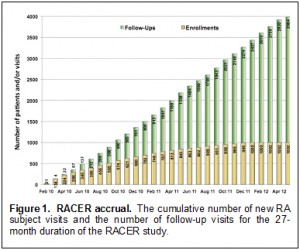The Rheumatoid Arthritis Comparative Effectiveness Research (RACER) Study at the University of Pittsburgh.
 The RACER study is funded by a NIH RC2 Grand Opportunities (GO) grant and is a collaborative effort between the University of Pittsburgh and Harvard University. Drs. Levesque and Moreland are Co-PIs of RACER and the Harvard work is directed by Dr. Dan Solomon. One component of RACER is the creation of a comprehensive longitudinal RA database at the University of Pittsburgh using a network of 25 UPMC rheumatologists linked by an advanced electronic medical record (EMR). Within 23 months of RACER’s inception in February 2010, 1,000 RA patients of the planned 1,000 subjects were enrolled and to date there have been over 4,000 recorded RACER clinic visits (Figure 1). Funding from Genentech will permit continued longitudinal clinical assessments of RACER subjects at each follow-up visit. The RACER registry collects detailed clinical data from subjects and their physicians during each clinic visit, including a RAPID3 (mdHAQ), SF-12 (quality of life), WPAI (work productivity survey) and DAS28 CRP (disease activity measure). The detailed clinical assessment is paired with data from the EMR including medication use, laboratory results and x-ray results. Blood samples including serum, plasma and peripheral blood mononuclear cells (PBMC) are collected at each visit, processed and stored frozen for later use. DNA was collected from each subject. C-reactive protein (CRP), RF and anti-CCP2 levels are measured on each subject at each visit. The RACER database is part of the Autoimmune Disease Data Management System, which is part of the Methodology Core of the University of Pittsburgh Multidisciplinary Clinical Research Center for Rheumatic and Musculoskeletal Diseases (MCRC).
The RACER study is funded by a NIH RC2 Grand Opportunities (GO) grant and is a collaborative effort between the University of Pittsburgh and Harvard University. Drs. Levesque and Moreland are Co-PIs of RACER and the Harvard work is directed by Dr. Dan Solomon. One component of RACER is the creation of a comprehensive longitudinal RA database at the University of Pittsburgh using a network of 25 UPMC rheumatologists linked by an advanced electronic medical record (EMR). Within 23 months of RACER’s inception in February 2010, 1,000 RA patients of the planned 1,000 subjects were enrolled and to date there have been over 4,000 recorded RACER clinic visits (Figure 1). Funding from Genentech will permit continued longitudinal clinical assessments of RACER subjects at each follow-up visit. The RACER registry collects detailed clinical data from subjects and their physicians during each clinic visit, including a RAPID3 (mdHAQ), SF-12 (quality of life), WPAI (work productivity survey) and DAS28 CRP (disease activity measure). The detailed clinical assessment is paired with data from the EMR including medication use, laboratory results and x-ray results. Blood samples including serum, plasma and peripheral blood mononuclear cells (PBMC) are collected at each visit, processed and stored frozen for later use. DNA was collected from each subject. C-reactive protein (CRP), RF and anti-CCP2 levels are measured on each subject at each visit. The RACER database is part of the Autoimmune Disease Data Management System, which is part of the Methodology Core of the University of Pittsburgh Multidisciplinary Clinical Research Center for Rheumatic and Musculoskeletal Diseases (MCRC).


